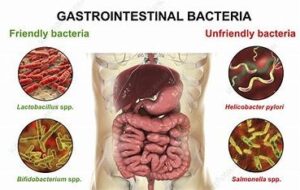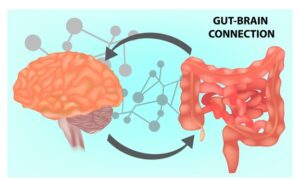The food we eat every day is not just food for ourselves but also for trillions of microorganisms that live inside of us. These microorganisms live primarily within the gut and can weigh up to six pounds. For a part of the body that large, it has gone mostly unseen and unnoticed. However, the new field of study of the microbiome shows links that impact everything from the immune system to Parkinson’s and infections.
The microorganisms that live inside our microbiome differ between each and every one of us and is influenced by something as simple as a vaginal birth or C-section birth. The earliest part of the baby’s life is the most important in the establishment of the microbiome, as the organisms that are transferred to the baby will last the rest of their lives. Mother’s milk compared to formula is also seen as the healthier option for the baby and establishment of a healthy microbiome (M. Rauhut, personal communication, October 31, 2024). The best way to support the health of your gut microbiome is to have what is described as a traditional diet, high in carbohydrates and fiber (M. Rauhut, personal communication, October 31, 2024). This diet lets the microorganisms produce a wide variety of micronutrients that our bodies would be unable to create otherwise. Having a diet high in animal protein and sugars can lead to an increase in unhealthy and unhelpful microorganisms (M. Rauhut, personal communication, October 31, 2024).

“Large Intestine, Illustration – Stock Image – C027/7483.” Science Photo Library. Accessed November 1, 2024. https://www.sciencephoto.com/media/703782/view/large-intestine-illustration.
A critical component of the microbiome and its microorganisms is how they have been proven to affect other parts of the body. New studies have shown that some common infections can be cured by transplanting a healthy microbiome into a sick person’s gut. This is accomplished through a fecal transplant procedure. However, this operation has also been seen to transfer someone’s anxiety or depression to the recipient, proving that mental health is deeply connected to the gut. Many of the neurotransmitters that are used in the brain are created in the gut, and these transmitters can create the feelings of stress and happiness that all experience day to day. The immune system is also connected, as it controls what passes into the body, and when the immune system has been compromised for too long it can lead to inflammation, which in turn can lead to depression and Alzheimer’s (Robertson, 2023).

“What Is the Gut-Brain Connection? – Life First.” What Is The Gut-Brain Connection? – Life First. Accessed November 1, 2024. https://www.lifefirstassessment.com.au/blog/2020/june/what-is-the-gut-brain-connection/
The gut microbiome has proven to be one of the most understudied organs in the human body. New developments are happening all the time. Just a few months ago a new study came out that shows that intermittent fasting can actually help promote a healthy microbiome (M. Rauhut, personal communication, October 31, 2024).
References:
Robertson, Ruairi. “The Gut-Brain Connection: How It Works and the Role of Nutrition.” Healthline, August 20, 2020. Retrieved from https://www.healthline.com/nutrition/gut-brain-connection.